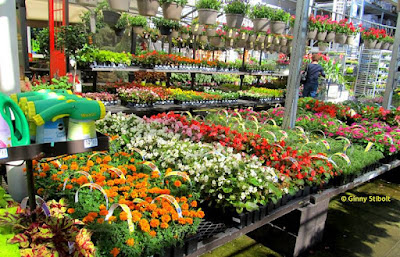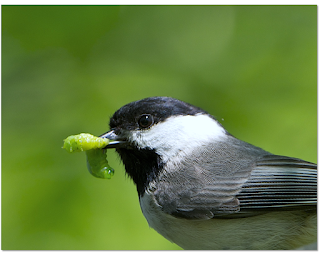 |
| Consumers are presented with this array of mostly nonnative plants in full bloom to plant so their yards can decorated with plants at peak bloom all the time. |
Where are the native plants?
New homeowners and beginning gardeners find displays similar to this photo that I took at a big box store a few years ago. It's filled with mostly nonnative annuals in full bloom. Each tray is not too expensive, but after they fade in a couple of months, people are expected to come back to replace them with the next set.
Examples in garden magazines and gardening TV shows with their instant landscapes imply that garden installations are events, and not ongoing projects that develop over the years.
| Those perfect-on-the-shelf plants have often been treated with systemic insecticides so they won't be eaten. |
There is a whole plant-growing industry in place to ensure a steady supply of these pretty-on-the-shelf plants. One ugly aspect of this business is its use of systemic insecticides so the plants are protected from various bugs that might eat them. As you might expect, plants with holes in their leaves and swarming insects don't sell as well as those with no holes.
BUT... those insecticides are in all parts of the plants, even the flowers, and they poison the would-be pollinators in the homeowners' yards. So these plants are the last thing you want in a pollinator garden.
So for pollinator gardens, people need to find sources for unpoisoned plants. Growing plants from seed is one way to go, but garden centers that offer unpoisoned and mostly native plants is another good and much quicker method. And attracting the adult pollinating insects is only part of the process. A complete pollinator garden includes the larval food for those pollinators and often, the larvae are caterpillars.
The relationship between insects and other organisms that eat them is long and complex within the local ecosystem, so native plants are the best choice. A plant that has been imported from another part of the world may offer good nectar for the adult pollinators, but they may not support the larvae.
New research now shows that interactive (functioning, native) ecosystem is far more productive of all the benefits we look for from our environment. Also, more is being discovered now about interactions - things we couldn't know before -between plants and plants, plants and wildlife, the importance of local mycorrhizal fungal interactions.
 |
| Caterpillars are baby bird food |
If you want birds in your yard,
you must first invite the insects.
A single pair of breeding chickadees must find 6,000 to 9,000 caterpillars to rear one clutch of young, according to Doug Tallamy, a professor of entomology and wildlife ecology at the University of Delaware. Even though seeds are a nutritious winter staple, insects are best for feeding growing fledglings.
So a bird-friendly yard must also have a good proportion of native plants, especially native trees such as oaks, which host a great variety of caterpillars.
 |
| Native plants play an important role in your yard. This photo is by Jenny Welsh of the Florida Native Plant Society. |
Native Plant Resources
Read his books: "Bringing Nature Home" and "Nature's Best Hope" for more background. And after you have added native plants to your yard, get on the map and register to become part of Tallamy's Homegrown National Park.
Florida's native plant resources
- If you would like to talk to HOAs, gardenclubs, community groups or others about why natives are important, here is a link to a 10-minute PowerPoint presentation with a script that Marjorie Shropshire and I created that you are free to use as often as you like. It downloads as a pdf file, but there is a link to the actual preentation in that file. It is also downloadable from the FNPS website. Why Natives are Important.
What prompted this blog post?
 |
| FYI, I have been a "guest ranter" on several occasions over the years. www.gardenrant.com |
Back in 2007, Elizabeth Licata posted this excerpt from Allan Armitage’s 2006 book, "Native Plants for North American Gardens" in the Garden Rant blog: "Like many gardeners, I enjoy mixing natives with exotics; I am simply not capable of limiting myself to one or the other exclusively. Most gardeners are country blind, and that is a good thing. Our gardens and landscapes are richer for the diversity and assimilation. Some people prefer to celebrate only those plants which “belong” here, and they will talk you to death about why this is right. I like to celebrate plants that work in my garden, and I let the plants do the talking." https://gardenrant.com/2007/12/and-heres-what.html
And then in August 2023, Licata wrote again about Armitage and his recent article on how natives are not always the answer and people who insist on natives miss the mark. https://gardenrant.com/2023/08/a-familiar-voice-speaks-out-on-natives-and-pollinators.html
I made a comment that I disagreed with his position and that we should use natives when possible. The reaction to my comment was swift and harsh. Several people commenting there, started criticizing my stance on natives on my personal feed and one person was so harsh, rude, and insistent that I finally blocked her. What follows are some of the comments people made about native plant enthusiasts.
" I call them the 'native plant militants,' which seems a bit silly to me. Instead of imposing judgmental perspectives from a self-proclaimed moral high ground, why not promote a culture of encouragement?
"The problem with the all native agenda is it fails to include humans as part of the ecosystem, rather than being separate from it. So in fact plant and animal nativism commits the exact same sin that got us into the global warming dilemma, the relentless positioning of humans as separate from nature."
"...there is no research thats supports your claim. The latest studies are showing that a healthy diversity in plants - native or non - is what makes pollinators happy. Also, your human habitat isn’t nature.
"There’s no need to bully people for their garden choices, yet that’s what many Facebook native plant warriors do. Very easy to do behind a screen.
"I’m so completely tired of this conversation and it’s fake morality. The native plant pushers have forgotten one crucial point - gardens are not nature. We live in a human habitat and our gardens are built in cities and suburbs in places where the “native” biome was eliminated many generations ago.
 |
| Yes, our yards are not wild areas. I wrote a whole peer-reviewed book on the topic. Order here. |
I'm not sure what their agendas are or whether they are working in the plant growing industry that supplies gardeners with all those nonnatives in full bloom that they need to replace several times a year to keep their gardens looking like the highly manicured gardens of Europe and Britain. But their human-centric gardening is worrisome in many ways. Somehow we need to overcome their hostility to people who promote native plant landscapes and I hope that we can find a way to talk about the importance of native plants without making them so angry.
I believe that together we can make native landscapes the new normal in Florida and elsewhere.
Green Gardening Matters,
Ginny Stibolt

No comments:
Post a Comment